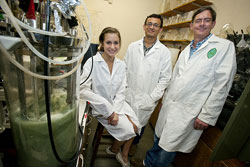News fit for fuel
With the help of bacteria, researchers turn newsprint into biofuel.
 |
| Tulane scientists have found a way to convert newspaper and other plant based materials into car fuel. |
Tulane researchers have found a way to turn old newspapers into biofuel that can run automobiles. They are feeding old editions of The Times-Picayune to a new bacterial strain in order to create butanol, a biofuel that is superior to ethanol as a gasoline substitute.
The bacteria, TU-103, is the first strain found in nature that produces butanol directly from the cellulose found in newsprint and myriad other natural sources, says David Mullin, associate professor of cell and molecular biology.
Mullin’s lab first identified TU-103 in animal droppings, then cultivated it and developed a method
for using it to produce butanol.
As a biofuel, butanol is superior to ethanol
(commonly produced from corn sugar) because it can readily fuel existing
motor vehicles without any modifications to the engine.
"This discovery could reduce the cost to produce bio-butanol," says Mullin. "In addition to possible
savings on the price per gallon as a fuel, bio-butanol produced from cellulose would dramatically reduce carbon dioxide and smog emissions in
comparison to gasoline." The innovative process also could have a positive impact on landfill waste. |